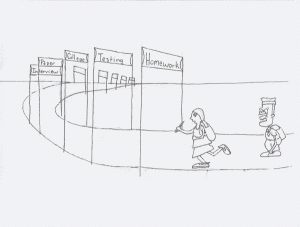 America was founded on the fundamental principles of freedom of expression, equality of opportunity, and democracy.
America was founded on the fundamental principles of freedom of expression, equality of opportunity, and democracy.
Each year, the SAT forces millions of students to sit in gyms and press microscopic layers of graphite into a bubble. To a certain extent, the SAT puts high school students in a box and hands them a number that represents their “net value”— what they’re worth.
The 21st century is marked by experimentation and innovation. Why does the SAT—a rigid, objective test—still hold great value in the academic society and, moreover, the college admission process?
When it comes to expressing yourself on the SAT, you’re given a meager 25 minutes to address your opinion on a given topic. More often than not, students choose to write an essay arguing the side with more evidence rather than the one they truly believe in.
Democracy allows for the voice of every citizen to be heard. Yet the College Board, a corporation, has a louder voice and greater impact on our college admissions than our own accomplishments. Moreover, the youth of America are not silent because they are too distracted by music pulsing through their eardrums or videos blinking in their eyes, but because they have been silenced by the so-called “reputable” and “reliable” colleges that choose to use this faulty marker, the SAT, to map our intelligence and potential.
Education is known as the great equalizer, bringing social classes closer together without completely amalgamating them. America is known for having a large middle class. America is known for having a structured education system where “no child is left behind.” Yet the SAT, a test meant to reflect the ideals of American education and promote a middle class, is only driving social classes apart. Is it reasonable that the future of America pays $44 to take a test that doesn’t even promote the ideals of American society?
We should rise above the SAT, and embrace tests such as “The Rainbow Project,” created by Yale psychologist Robert Sternberg that aims to test problem-solving and creativity rather than analytical skills. Although unlikely to be adopted by colleges in the near future, “The Rainbow Project” and other similar tests account for the principles of democracy, freedom of expression, and equality of opportunity.
This is Meghana Vunnamadala’s Junior Declamation.